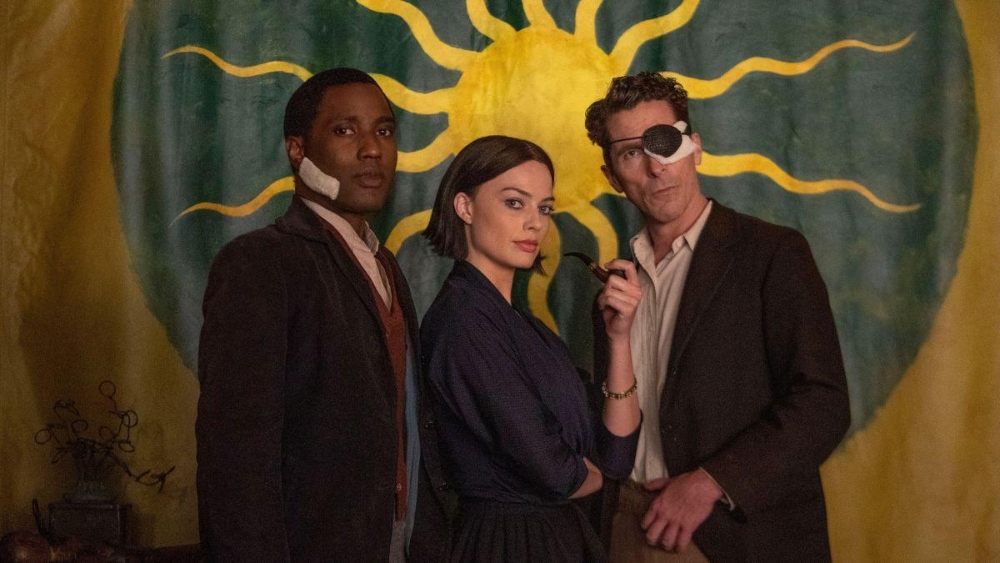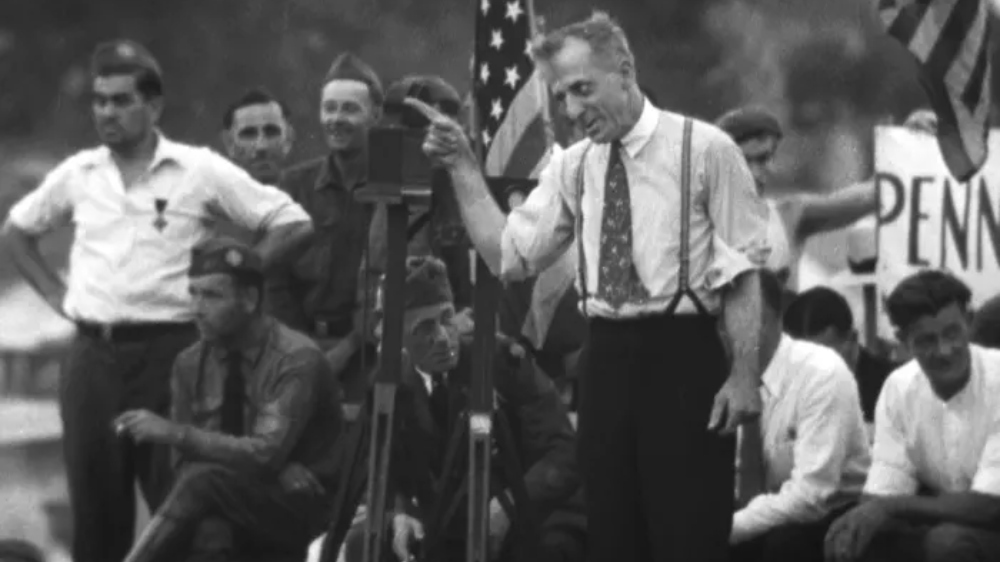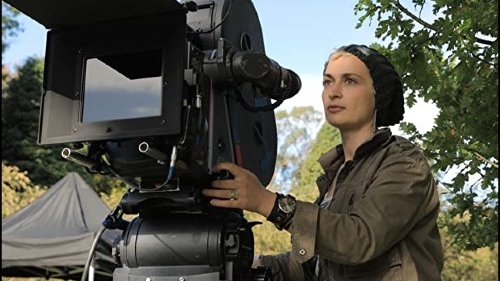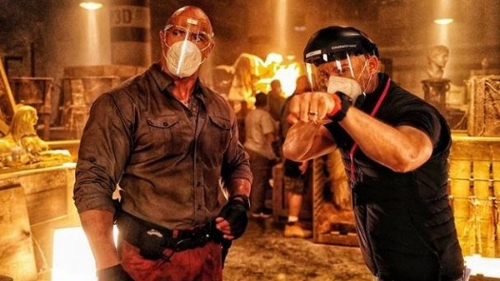
In the column business, one sometimes hopes for a quiet stretch of time to perhaps ruminate on things in print. Perhaps not everything will be collapsing this week, or caught up in a frenzy, one thinks.
One would usually be wrong, for there is always news.
On the rumination side, it was hoped there might be a moment for some briefly sensational news from some 70-ish years back, that flickered through the headlines of its time until it too was forgotten in the runup to World War II. Currently, it serves as the structural lynchpin for David O. Russell’s Amsterdam, described as a “comedy thriller,” which may also fit the present historical moment, though “tragedy” should probably be slipped in there somewhere, too.
In any case, the film is densely plotted, in a manner more familiar to ’70s neo-noirs, like, say Cutter’s Way, or maybe The Late Show. Despite compelling lead performances from Christian Bale, Margot Robbie, and John David Washington, who find themselves caught in a Depression-era love triangle (well, two sides in love, and one in support — there’s a French word for it) and sterling craft credits all around, the film is receiving decidedly mixed reviews and little box office support. The plotting may be too dense, after all, to suit present filmgoing tastes. Its story may even contain some loose ends.
But the film also contains one large surprise, which comes in the form of (spoiler alert!) Robert DeNiro’s character — the plain-spoken and highly decorated General Gil Dillenbeck, who’s based on Smedley Butler, an actual retired Marine General and a hero of “The War to End All Wars.”
In the movie, Dillenbeck is asked by a group of prominent businessmen to lead the disgruntled masses of mostly benefit-less World War I vets, all of whom revere him, in a putsch against Franklin D. Roosevelt in an attempt to dislodge him from the White House. Our three war-scarred and love-wounded leads get swept up in trying to stop the plot.

In real life, it was stopped by Butler (a Republican) pretending to go along with what came to be called “The Business Plot,” and then going to Congress with the information. This was back in the days before half of Congress actively supported putsches and coups d’etat.
What is startling is that a moment that is scarcely remembered now in the official annals of American history (though you can read more about it here, and maybe here) has taken, in a fashion, center stage in one of a major studio’s (hoped for) Oscar season offerings, which would appear to make it, then, Hollywood’s first official response to the events of Jan. 6, 2021.
And yet, few seem to be talking about the film in that context, which may mean that, like the Business Plot itself, the whole discussion of how close what’s left of American democracy has previously come to being overthrown, may again be relegated to the outskirts of what passes for mainstream discourse in these comically thrilling times of ours.
Amsterdam’s rough box office may preclude other studio attempts at such storytelling for a while, too. Though in the end, there may be more of an audience for such things out in “the streams.”
But the whole “Business Plot” near-miss serves as a reminder of how one can’t always assume that a dispossessed citizenry and workforce will then be emboldened to make changes that benefit a maximum number of fellow workers, or citizens. Just as often, they can be persuaded to seize their darkest impulses, in times of economic duress.
So let’s hope our current economy doesn’t get any more “duressed” than it is at the moment. Though that, too, may seem like a long-odds proposition.

Meanwhile, as you have doubtless read since our last column, Rust found itself back in the news this week, as Alec Baldwin and the film’s production company announced a settlement with the widower of Halyna Hutchins, the cinematographer who was killed on set by a live ammo round.
As Matthew Hutchins said in a statement, “we have reached a settlement, subject to court approval, for our wrongful death case against the producers of Rust including Alec Baldwin.”
The twist, however, is that as a result of the settlement, Rust will resume shooting in January, with Matthew Hutchins as one of the executive producers. If there was ever a film that didn’t need completing, one would think this would be it. Strangely, with Hutchins now sharing in the profits, which could presumably help build a nest egg for Andros, the 9-year-old son he shared with Halyna, the movie will now serve as a kind of cinematic GoFundMe for the grieving clan.
Whether that’s enough motive to get anyone into theaters to see it remains to be seen.
New Mexico authorities, meanwhile, are publicly keeping their options open on whether to still file criminal charges. District Attorney Mary Carmack-Altwies of New Mexico’s First Judicial District “vowed to proceed with the case,” according to the LA Times, saying “no one is above the law.”
On the other hand, the article also notes that the settlement “could certainly complicate the D.A.’s case… ‘If (Hutchins) is going to testify that he believes that it was an accident, it’s certainly not helpful for your case if you’re trying to pursue murder charges,’ said trial attorney and former federal prosecutor Neama Rahmani. Another potential challenge for the prosecution: Halting the civil case will limit one source of possible evidence prosecutors could use.”
Meanwhile, California’s attempts to ban the use of functioning guns (and blanks) on film sets have also recently fallen by the legislative wayside, so as with so much in our present age, we’re back to simply hoping the collective luck will continue to hold before anything else happens.
Which may also describe where Covid protocols, such as they are, currently stand.

Last week, we wrote of Hollywood collectively extending its current strictures, making it, perhaps, the last remaining sector of the economy with discernible virus regulations. And yet the Hollywood Reporter followed that up a few days later with an expose saying that isn’t the case at all.
“An atmosphere of noncompliance and casual disregard for the rules was ‘standard practice on the biggest shows around,’’ actress, medic, and COVID Compliance Supervisor Jen Lyon says in the article. “‘It was an absolutely toothless position. … We had no power whatsoever.’” One associate producer, who requested anonymity for fear of retaliation, told THR that supervisors on her set kept the crew in the dark about positive cases in the fall of 2021.
On the one hand, this comports with some emails we received early in the pandemic’s trajectory from a post-production worker in Vancouver, who claimed that positive tests were routinely faked or ignored in order to deliver VFX in time for a sci-fi spectacular released a few moons back.
On the other hand, one current COVID compliance officer we just messaged says he found it’s not that bad at all.
John Dean Alfone works on productions outside of L.A. “as a Covid-19 Compliance Officer primarily in Southern states, and all of my experiences with employers have been largely positive with Netflix, Animal Planet, A&E, and the Food Network leading the way.
“On the Netflix project in New Orleans, they spared no cost ensuring the safety of their set, as everyone was tested three times a week using a PCR test. I worked as a Health and Safety Monitor with them and was on a team comprised of at least 10 people in addition to a Health & Safety Supervisor, Health & Safety Manager, and Lead Red Zone Manager. Crew members who tested positive for Covid were always quarantined from the production.”
“A&E has also been a great employer, as no one is allowed onto a set without a ‘Negative’ Covid-19 test result. The Food Network was another detail-oriented ship and I recall working with them on a show in Knoxville, Tennessee, and them sending up a medical professional all the way from Atlanta just to complete our Covid-19 tests correctly.”
“All companies mandated masking at all times with KN95 masks being the mask of choice,” said Alfone.
As with so much then, your luck may simply depend on where you are, and when you’re there. Or, simply, whose set you wind up on. More rolls of the dice for dicey times.
We’ll see you in a week…
 Mark London Williams is a BTL alum who currently covers Hollywood, its contents and discontents, in his recurring “Across the Pond” dispatch for British Cinematographer magazine, contributes to other showbiz and production-minded sites, and musters out the occasional zombie, pandemic-themed, or demon-tinged book and script, causing an increased blurring in terms of what still feels like “fiction.”
Mark London Williams is a BTL alum who currently covers Hollywood, its contents and discontents, in his recurring “Across the Pond” dispatch for British Cinematographer magazine, contributes to other showbiz and production-minded sites, and musters out the occasional zombie, pandemic-themed, or demon-tinged book and script, causing an increased blurring in terms of what still feels like “fiction.”
Mark London Williams’ Union Roundup column will appear every Tuesday. You can reach him to give him tips and feedback at [email protected]. He can also be found on Twitter @TricksterInk.





